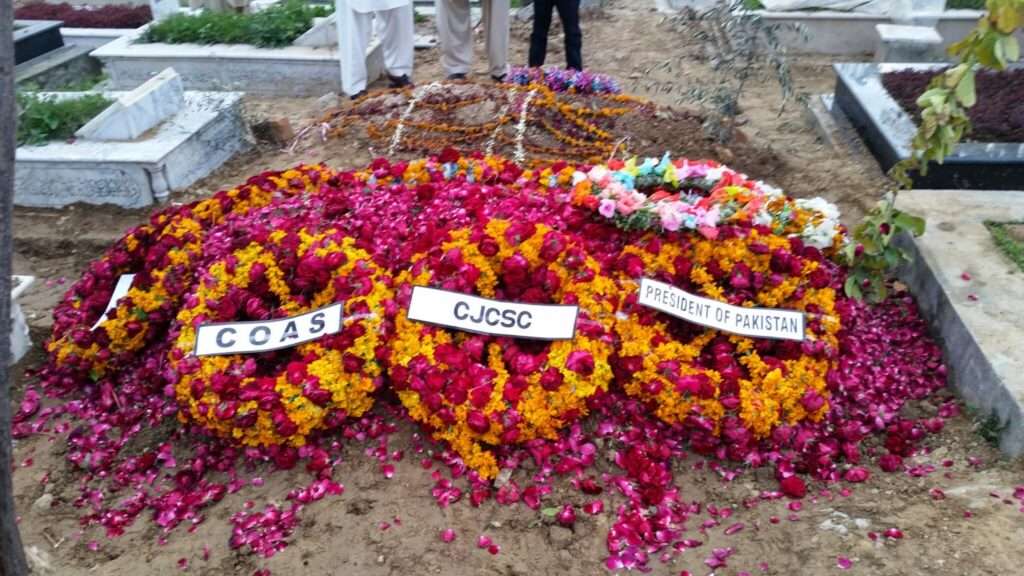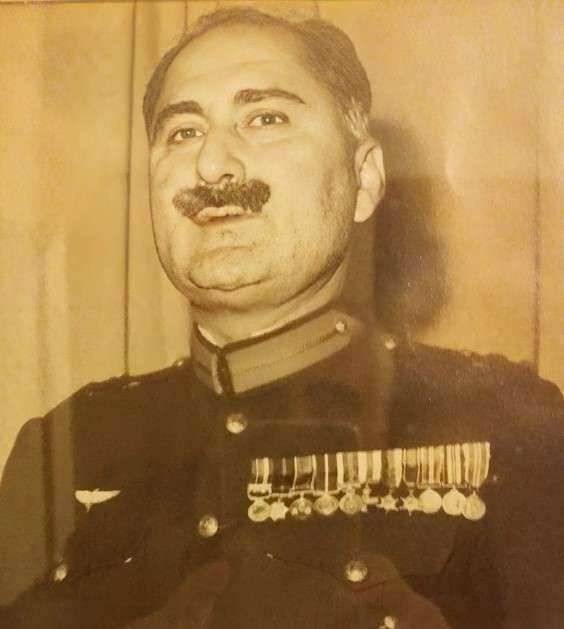This article is my attempt to recount some aspects of our father’s career as a soldier, a leading Geo Political authority & expert and above all, a most passionate and patriotic Pakistani and some aspects of his personal life.
He was born on 24 December 1921 in Karnal, East Punjab to Mir Khaslat Hussain and Ejaz Fatima. He was the eldest of 8 siblings. 4 brothers and 4 sisters. His given name was Mohammad Hussain and as was the culture in those days was also given another name, Syed Ghaffar Mehdi, by which he was and is known. His family were part of the Sadaat e Baarha of Barsat and Bidoli in India, or the 12 Syeds. These Zaidi Syeds, through Abul Farha Wasthi, are directly descended from Hazrat Zaid Shaheed, hence the name Zaidi, the younger son of Imam Zainul Abedin, and grandson of Imam Hussain.
Everyone said he was a voracious reader devouring history books.
As his sisters narrate he was also a sickly boy and one day got beaten bad at school by a Sikh class fellow. He vowed to come back next year and take revenge.
As the story goes his father, our grandfather, engaged a professional wrestler for the grand sum of 5 Rs per month to tutor young Mehdi in the art and science of physical wrestling and to beef up his muscles. And but of course the poor little Sikh boy didn’t know what hit him when they next met!!! Such was his determination, his hallmark which has been his badge all his life.
His love for Pakistan pre dated Partition.
As a young student in March 1940, he travelled with the Quaid e Azam from Ferozepur to Lahore hanging outside the Quaids compartment along with my later father in law to be Syed Nusrat Hussain Zaidi, his childhood friend, where the Quaid was to make his historic 23 March Address. My late father in law, Bubba to all, the epitome of grace and silent brilliance, was one of those rare people who could stand up to Agha. Their friendship further strengthened by my marriage to his angelic daughter, my best friend and childhood sweetheart, Shaheena (Sheena).
Later he joined the army in 1941 and fought in the 2nd World War in Burma. On 14 August 1944 Agha wrote to the Quaid e Azam on his Regimental letter head, donating his 26 acres of prime agricultural land to the Muslim League given to him in lieu of his Military Cross for Valor in Burma in the 2nd World War.
On 22nd December 1945, he wrote to him again on the Regimental letter head of his unit 1/15 Punjab Regiment, now 9 Punjab, excitedly describing to, I am sure, a pretty bemused Quaid, about his first parachute jump.
The Quaid e Azam replied to his letters in “…emotional overtones rarely seen in his letters..” so quoted Khalid Shamsul Hassan saheb, son of Shamsul Hassan saheb, the Quaid’s Private Secretary, from whose archives the Quaid’s reply was originally discovered by me through an incredibly chance encounter in 1982, while I was working for DAWN Newspaper after leaving the Army in 1981, I happened to visit the late Khalid Shamsul Hassan saheb, son of the late Shamsul Hassan saheb, the Quaid’s private secretary, in his office in National Bank of Pakistan and being the curious questioner asked about a row of thick books on his bookshelf.
He said these were records of the Quaid’s correspondence with people which he had compiled from his father’s records. I told him how wistfully our father would tell us about the letters he had written to the Quaid and how the Quaid had replied. And his greatest regret in life was losing the Quaid’s letter to him during the move to Pakistan during Partition.
Upon hearing his name he looked up sharply, walked to the bookshelf. A minute or or two later he showed me two documents. The Quaid’s letter to a certain Lt. S.G. Mehdi as well a letter written in Urdu dated 14 August 1944 (3 years to the day before Independence) from the same person to the Quaid.
I immediately recognized Agha’s writing and excitedly requested a copy. The scene back in the house when I gave him these letters was completely unexpected. This hard as nails ex SSG COMMANDO just slumped in his sofa chair with silent tears rolling down his cheeks as he read and re-read and re-read the letters over and over again. My heart went out to him as I realized how excruciatingly painful and sad it must be for him to see the state of the country. This was 1982 with Zia’s terrible rule at its peak.
These letters, now with us, are perhaps our most cherished of our father’s legacies.
But in those days in 1944 this letter writing nearly got him court martialed for indulging in political activities by writing to the Quaid as a serving officer. But the unit Subedar Major informed the British Commanding Officer that the unit would revolt if Captain “Killer” Mehdi as he was fondly known, was court martialed.
He was a member of the boundary force transferring refugees between India and Pakistan and saved 1000s on both sides from certain death. His bristling moustache, booming voice, one arm akimbo arrogantly on his waist the other holding his sten gun at the ready, on top of his jeep, and his troops were mostly enough to put the fear of God on both Muslim and Hindu marauding mobs. As a result not one of the trains and convoys he escorted suffered a single casualty.
He alongwith Col.Latif later Brigadier, Lt. Col later Lt. Gen. Attiq ur Rehman, Maj later Maj. Gen. Abid Ali Bilgrami, Major later Lt. Gen Abdul Hamid Khan, Captain later Gen.Tikka Khan, and others formed the officer nucleus of the new Pakistan Military Academy. Earlier when he was posted to the Indian Military Academy in 1946 the Commandant Brig. Iyappa told Lt. Col. Atiq-ur Rehman that “Mehdi was a real find”!
In Pakistan Military Academy He was specially selected by the first Commandant Brig. Ingall to become its first adjutant. As adjutant, he famously did his rounds, not on foot but on his horse!!
This is where he married and brought his beautiful, most elegant and angelic life partner our dearest mother, Sultana Mehdi from the great and proud Qazilbash clan, part of which had settled in Lahore. May Allah Bless her Dear Departed Soul. A partnership which continued through thick and thin till March 2010 when our dear mother passed away. Bibi as we and everybody addressed her as, this wonderful graceful angelic lady, who never ever thought or said ill of anybody, always stood by him and was the balm that gave him solace in his darkest hours of professional loneliness.
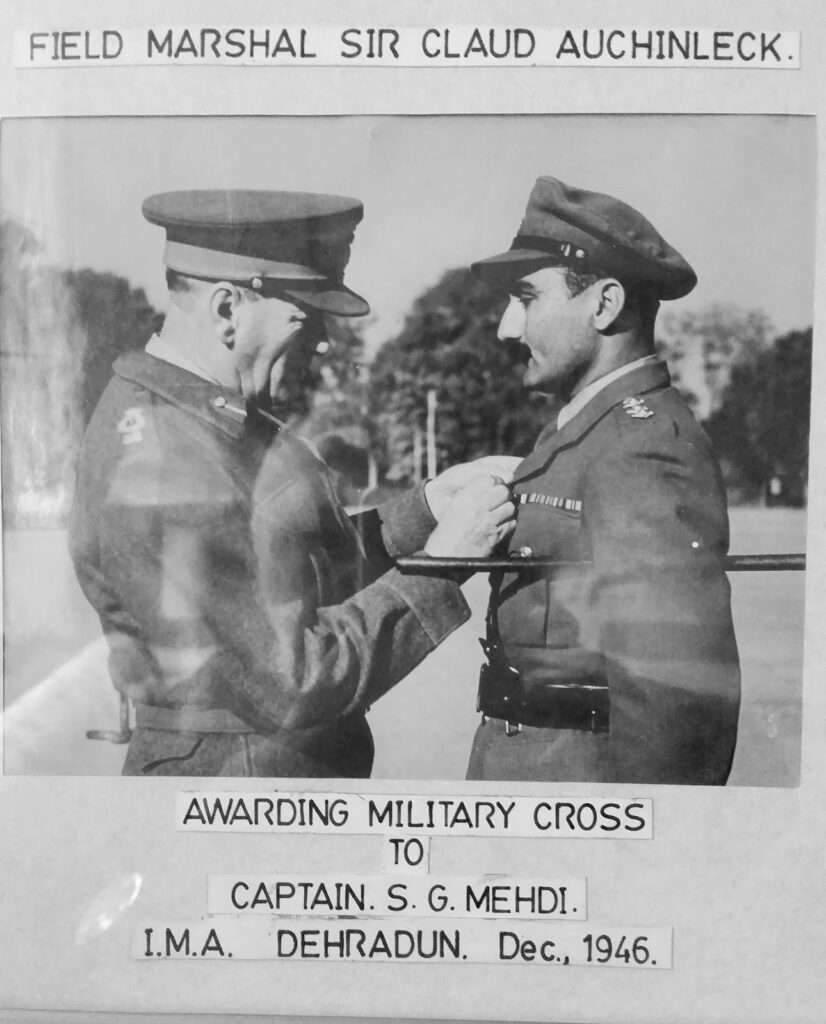
Agha then became founder Company Commander of Qasim company in PMA. Many of Pakistan’s Army’s future generals were cadets who “passed out” the Military’s strange way of saying “graduated” from the Academy under the stern gaze of “Killer” Mehdi. Lt. Gen Fazle Haque, later Governor of then NWFP, Lt. Gen Salahuddin Abbassi later Governor Sindh, Lt. Gen Rahimuddin, later Governor Baluchistan were among the few I can recall now.
One of his favourite cadets was the effervescent quick witted full of humour most wonderful gentleman His Excellency the Wali of Swat, Mian Gul Aurangzeb, then ‘GC” Aurangzeb or Gentleman Cadet Aurangzeb. In later years when Miangul Aurangzeb was Governor, Baluchistan, he and his most elegant, life partner, the beautiful Begum Naseem Aurangzeb, daughter of President Ayub Khan, an epitome of grace and beauty, hosted Agha on several occasions, which Agha cherished deeply, especially at a time when he was in the woods. This mutual love and respect is now reflected in my deep friendship and affection for Mian Gul Adnan Aurangzeb, his elder son, who exemplifies the sterling qualities of both his parents.
Later Agha became an instructor at the Staff College Quetta and also subsequently helped establish the War College with Maj. Gen. Yaqub and became its first Chief Instructor. Before and after he served on many key staff and command roles as Brigade Major, G2, G1, Col Staff, Commanding Officer and Group Commander SSG, as well as staff appointments at the GHQ.
He was the only officer till 1950 to have been given a Distinction in his Staff College Course in Camberley, England.
While one can recount countless tales of his incredibly colorful professional life, one incident when he was a Major and G2 Plans in the SEATO (South East Asian Treaty Organisation) secretariat in the mid 1950s is worth narrating.
SEATO was an international Defence pact of 8 countries lead by the USA to curtail communist expansion in South East Asia. The members were Australia, France, New Zealand, Pakistan, Philippines, Thailand, United Kingdom and United States. This particular year, Pakistan was hosting the Foreign Ministers and of great importance was for them to present a forceful case of the Northwest threat from Afghanistan because the now famous late John Foster Dulles, the US Secretary of State was attending and military aid to Pakistan was high on the agenda.
Late Maj. Gen. Nawabzada Sher Ali Khan Pataudi, who headed the Pakistani defence delegation of which young Mehdi was a member as the Staff Planner, tried to convince the then Pakistani Foreign Minister, Mr. Amjad Ali, to allow Gen. Sher Ali to speak when it came to the “military” part of the Minister’s presentation. FM Amjad Ali would have none of it and insisted he would present, much to Gen. Sher Ali’s acute displeasure and frustration. Reluctantly Sher Ali gave in. Major Mehdi was in the threesome as this was being hotly debated.
As FM Amjad Ali made his presentation and came to the military portion, I narrate the incident described by Air Marshal Asghar Khan in his book “The Lighter side of the Power Game” in a chapter titled “A Major’s Coup” !!.
…….” a ferocious looking army paratroop Major leapt from behind the Chairman’s dias. Unfolding a large map in front of the foreign minister and hiding him from view he clicked his heels and addressing the SEATO council said: “Gentlemen I will now brief you on the military threat from Afghanistan”.
…..”What is all this”? asked Amjad Ali in a whisper to the General seated next to him. “How should I know” was the reply. “I’m as surprised as you are”. Let’s see what he has to say”.
The Major had in the mean time started at high speed with a torrent of military jargon and terminology. His manner was so forceful and he appeared so determined that nothing could be done but to let him have his say.
…..The SEATO foreign ministers looked at each other in amazement and at the head of the Pakistani delegation as if to say “ what’s going on?”
Amjad Ali had one more try at repairing the situation and asked the General to “stop him”. “ How can I” said the General “I didn’t start it”.
Amjad Ali then slid back into his chair, gazing vacantly at the ceiling till the Major had said all he had to say which must have taken 10 to 15 minutes……..”
In later years Agha would recount this story amidst rip roaring laughter. But he never told us if this was pre-planned with Gen. Sher Ali or it was his own doing. I strongly suspect the latter, as Gen. Sher Ali was too much of a “proper” military person to have given such a go ahead.
Agha commanded two field units, 15 Punjab and then later the SSG.
He Commanded 15 Punjab also known as 33 Mohammadis in Bannu and being the maverick that he was, bought a Horse Tonga in beautiful black and gold, and would drive it himself in the Cantonment to the amazement and amusement of both civilians and military.
Once I vaguely recall as a terror stricken 3 year old, him averting a serious accident as the horse went wild and with the whole family sitting , dashed wildly out of control. All I recall in those fearful moments were his colorful phrases trying to control the panicked animal, which he eventually did.
The unit became the top battalion in the Division prompting his good friend and Brigade Commander Brig. Sharif later Gen Sharif to remark…”Killer, leave some trophies for the other units!!
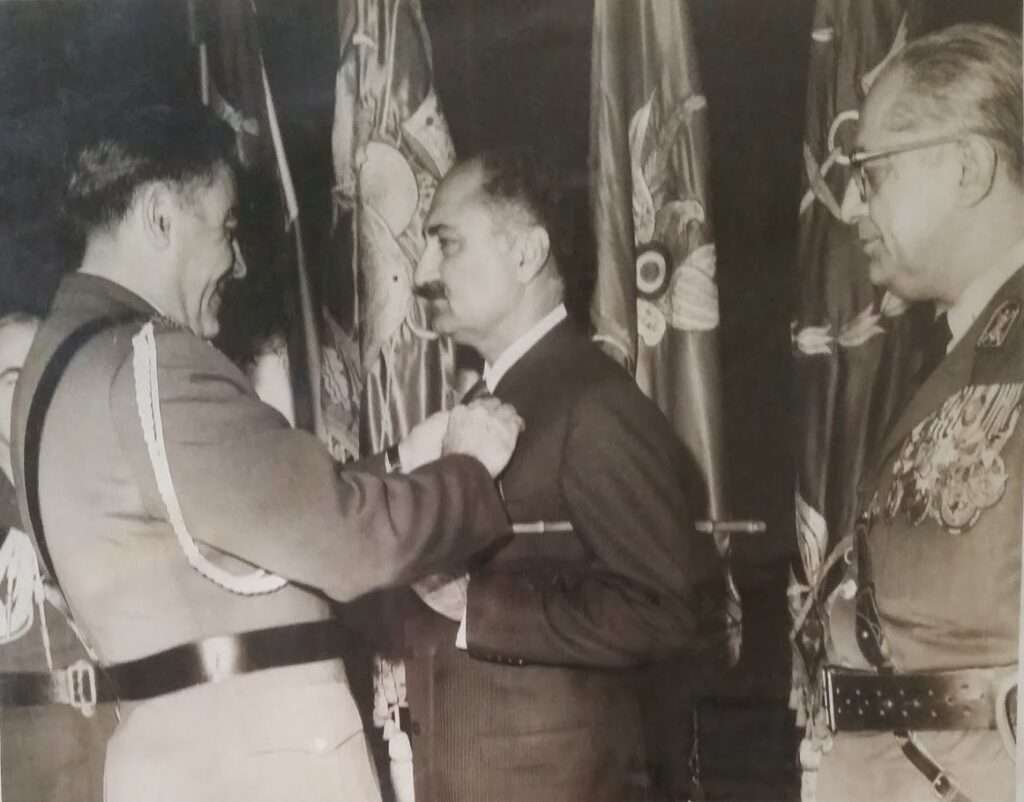
His troops both loved him and feared him and so honored him in later years after his retirement by making him the Honorary Colonel of the Battalion.
Many people also don’t know that one of the reasons he was handpicked personally by Gen. Ayub to head the SSG was because of an earlier assignment the late President Ayub had personally given Agha.
This is 1962 – 63. The Afghans were stirring trouble in Baluchistan directly and through the then Khan of Kalat. Col Mehdi then in a Staff assignment in Quetta was given the undercover task to operate inside Afghan territory and conduct clandestine operations. It was completely hush hush. No military units were to be involved. Only the Corps Commander knew other than the President and Col. Mehdi and two other people. It was a case of complete deniability should these guys ever be caught.
Agha got 100 or so of top Mehsud marksman from Waziristan through his old Subedar Major of World War 2 days, had them trained in mining bridges etc and raiding small Afghan pickets. These guys made life hell for Afghan military convoys and pickets and posts with no casualties on the Pakistan side. A few months later President Ayub came to Quetta. At the airport as Col. Mehdi saluted him in the reception line he gently put his hand on our father’s shoulder and said ever so softly. “ Call it off Mehdi…they’ve agreed to talk” and that was it.
No medals no commendation. This was just pure duty and patriotism. The Mehsuds went back suitably enriched beyond their dreams. Clandestine operations pay well !!
His crowning glory at SSG was to transform the SSG from a Guerrilla outfit under the control of USA military advisers whose task was to launch insurgency operations against a possible future Chinese occupation of Pakistan with targets such as the Radio Pakistan, Ravi Bridge etc!!. into a Commando outfit operating behind enemy lines and conducting Special Operations.
For reasons better known to them, the two previous commanders did not find anything amiss in keeping SSG’s role confined to fighting the Chinese occupiers of Pakistan on behalf of the Americans. One was then Col. Mitha, later Gen and I forget the second. When Agha took over, his first request to GHQ was the removal of all American advisers and their families from Cherat, then the SSG Headquarters. The Americans strongly resisted and as a final threat refused to help establish the parachute training school if the GHQ agreed to Col. Mehdi’s request.
GHQ was in in a quandary, till he got onto a jeep, went down to Pindi and in his extremely logical manner convinced and assured them that the Para School would go ahead without the Americans and that he had the necessary local Jump Masters to do the job. I’m not sure if that was true, but he would do anything to get rid of the Americans. So the USA military advisers left. And the Para school established. 1000 para commandos trained and ZERO casualties. The Americans had a 5% casualty rate documented as part of their SOP!!!
At age 44, he was the first jumper out of the plane of this first batch of Para commandos wholly trained by Pakistani instructors.
His last jump before that was in 1945. 19 years ago. !!! Earlier an incredulous instructor tried to dissuade him saying…Sir even the parachutes have changed now from your 2nd World War time…but he would have none of it…so he did two quick tower jumps and off he went to the plane.
He renamed Cherat as the Eagles Nest. Personally gave the idea and oversaw the design of the SSG para wing, it’s famous insignia of the Dagger and lightening bolts, the selection of the distinctive Maroon beret and the label of SSG soldiers as Janbaz and not Jawan.
The SSG officer and soldier was a “Mun Janbazum”. I am a Janbaz. Ever ready to lay down my life.
He also had as their battle cry the stirring. Ya Ali !
The last falling victim to sectarianism during Gen. Zia’s time.
His lasting legacy to SSG perhaps was the Angry Eagle exercise, considered one of the toughest military exercises in the world done over several months. Now I believe discontinued.
He was the ultimate commander and loved his troops and officers, always fought for them and supported them. He was also the ultimate disciplinarian and detested cowardice. He embraced Courage with a capital C. Both Physical and Moral.
The former got him his Military Cross the latter cost him his career.
His Military Cross action is an interesting and bizarre episode with an aspect of humor which perhaps only the brutality of war can bring out.
One day in 1943, While leading a Jungle patrol in Burma his patrol suddenly came across a Japanese one. Both equally surprised to see the other!!
Both sides opened fire instantly and he hit the ground as he had been at the front of the Patrol. Soon the firing from his side subsided and he thought all his men had been killed.
The Japanese called out to him to surrender. Hidden in the bush he decided to fight it out. And as fate would have It he killed all 10 by surprising them from an unexpected side. He searched for the bodies of his own troops and couldn’t find any!!.
Meanwhile he collected “evidence” of his encounter too gruesome to describe here including the ceremonial Samurai sword of the Japanese officer leading the Japanese Patrol. He then headed back to his unit headquarters with his “booty” ….”his boots completely covered in blood up to his ankles….” as noted his MC citation, from the “booty collection”.
There he found his entire patrol all alive, describing to the others how valiantly “Captain saheb” had fought the Japanese before being gunned down to death. And how the Patrol had desperately tried to retrieve his body but couldn’t but in the process did kill quite a few Japanese.
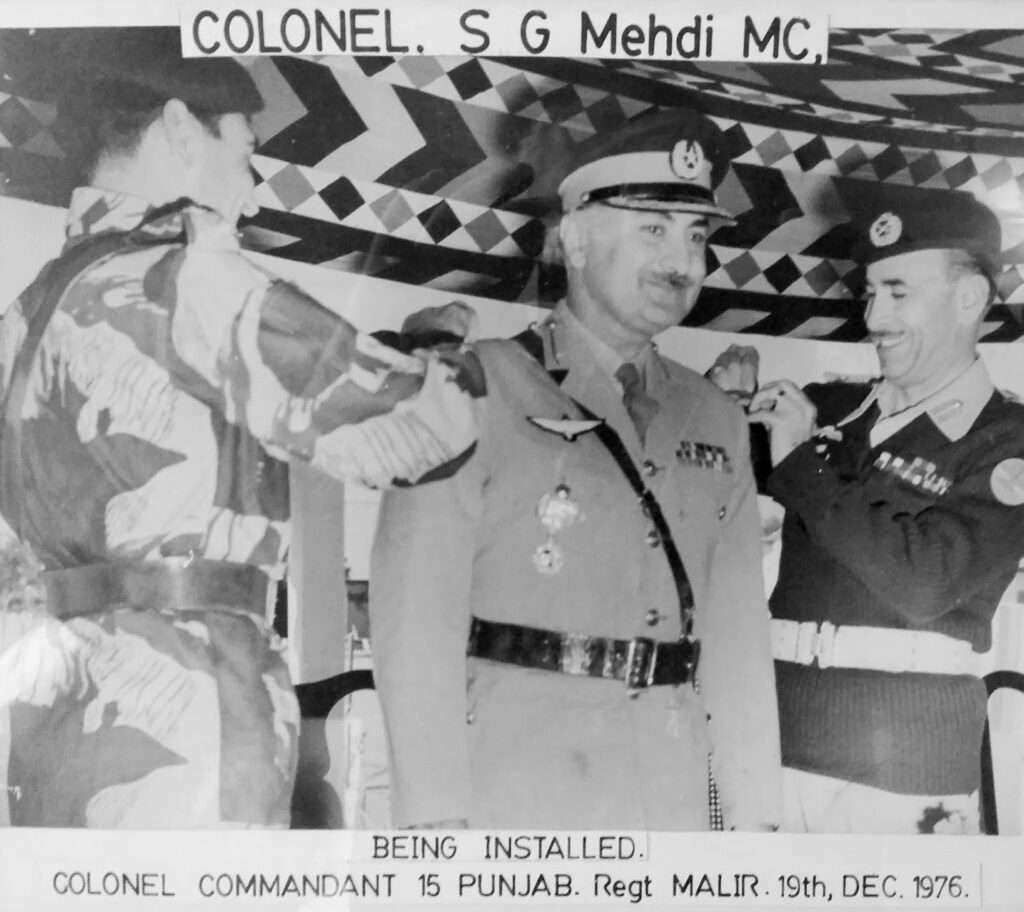
What had actually happened was that the Patrol seeing him go down as the firing started deduced that he had been killed instantly. And discretion being the better part of Valor decided it was better to live and fight another day. What happened to them is another sad story of course.
The Ceremonial Samurai sword now decorates my house wherever I live.
It is a source of great honour and inspiration to all of us of this great fearless, courageous man.
His tales are still recounted with glee and laughter and respect and inspiration in the officers messes, unit lines, in the corridors of military offices, training institutions and training grounds where ever he served this great Army and Pakistan.
Finally retiring in December 1968 on his birthday as Station Commander Karachi. Even in this gentle assignment he made waves. While receiving Alexi Kosygin the then USSR Foreign Minister on a visit to Pakistan in 1967 he refused to lean forward even slightly to shake Kosygin’s hand and so the Russian foreign Minister had to do the bowing. The picture captures this event ever so vividly. Politely enquired ( by now no one messed with him, even the C in C) he said…” a soldier only bows when he falls to an enemy bullet…”
He never suffered fools, always said what he thought was right and always stood by his values and convictions.
As Group Commander SSG in 1965 he strongly opposed the ill fated infiltration of Pakistani SSG Commandos into occupied Kashmir, called Operation Gibraltar. This was the brainchild of Maj Gen Akhtar Malik, otherwise a brilliant soldier. Both respected each others professional brilliance but this time were on opposite sides of a major operational decision. The plan was to infiltrate commandos and other troops inside occupied Kashmir, carry out hit and run raids, live of the land and give Pakistan a strategic advantage. Agha termed it a “Bay of Pigs” and said the operation would fail, similar to the ill fated USA attempt to land troops in Cuba. He said this because of its operational and tactical lack of preparedness and planning. Hence he refused to go along with the Army High Command.
In a famous encounter with Gen. Musa then the C-in-C, a decent man but a professionally challenged individual, Agha told him after Gen. Musa had heard both him and Gen. Akhtar Malik present their arguments for and against Gibraltar. .”…Sir you’re the Commander in Chief so now tell us what do you think? ….
Gen. Musa remained silent. Col. Mehdi repeated the question again this time very forcefully. To which Gen.Musa replied…It’s always very interesting listening to you Col Mehdi saheb…” at this Agha saluted turned to Gen. Akhtar Malik and said…” You won’t get away with this…” and stormed out of the C-in C’s Operations Room.
He went back to SSG Headquarters and put his concerns in writing via a signal formally to GHQ. He was then told by GHQ to destroy his copy of his signal as they had done the same. He didn’t and years later his stance was vindicated by all and sundry.
Thus on 30th August 1965, he was sacked as Group Commander SSG. The Operation went ahead sending countless young men to certain death. Interestingly SSG records show him as the Commander right upto 21 September 1965. Perhaps a ham handed effort to tag Operation Gibralter’s failure to his name in subsequent narration of history. Who knows. The record has to date not been corrected.
After the war Gen. Akhtar Malik and Agha reconciled and in 1966 both met in Quetta when Gen. Akhtar Malik was Commandant Staff College. Gen. Malik’s younger son Latif Malik and I were class fellows and very close friends in Lawrence College and are still in contact. Gen Malik tragically died in a car accident alongwith his wife in Turkey in 1968.
But the SSG has always been Agha’s dear love and they have reciprocated in kind. They have honored him in life and in his transition much much beyond what one expected. His photograph occupies the central location their HQ, the ultimate honour to its real founder and pioneer.
I have seen my father cry only four times in my entire life. Crying means silent tears.
- At his mother’s passing away.
- On hearing about the failure of Operation Gibralter and the casualty count of those young officers and Janbazs who he had nurtured like his own childten.
- On the fall of East Pakistan in December 1971.
- And finally the day he re-read the letters he had written to the Quaid e Azam and the Quaid’s reply the first found through Khalid Shamsul Hassan saheb and the second from the Quaid e Azam archives in Islamabad, through the kind courtesy of late Dr. Zawwar Hussain Zaidi the then Director of the Archives. These letters are a source of great pride for the whole family.
After being relieved of his command of the SSG for opposing Operation Gibraltar he found himself as Col. Staff of 15 Div in Sialkot, under Brig Ismail (acting Maj. Gen). As Col. Staff he took it upon himself to deploy 15 Division in its battle positions on 4th September, well before the 6th September Indian Attack, which caught many other formations completely off guard. Subsequently Brig. Ismail was relieved of his command for some poor decisions, one being the blowing up of Jassar Bridge, much against Agha’s extremely forceful request not to do so. But the Pakistani Brigade Commander, Brig. Muzaffaruddin, had cold feet and thought that the Indians had crossed over Ravi to our side and established a bridgehead, hence the need to destroy the bridge to stop Indian reinforcements and also to isolate the “phantom bridge head”.
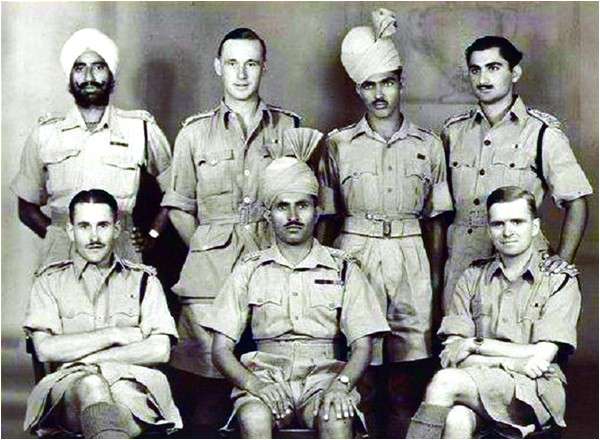
After the bridge was blown up, the result was NO bridgehead and NO bridge!!. But for the brave valour of late Brig. later Lt. General Abdul Ali Malik, HJ, and his 24 brigade it would have been a major disaster for Pakistan. Brig Abdul Ali Malik was the younger brother of Gen Akhtar Malik earlier mentioned with respect to Operation Gibraltar. But such is this nation’s tragedy that Brig. “cold feet” Muzaffar went on to become a Major General.
Maj. Gen Tikka then took over command of the division, Agha did not see eye to eye with his GOC on operational matters. In their final encounter Gen Tikka asked him to clear all correspondence with him before dispatch to GHQ. This happened as a result of an enquiry initiated by Agha on Indian troops operating behind Pakistani lines and killing people. This was Gen. Tikka’s view.
Agha’s view was that this was most likely friendly fire and frayed nerves causing own troops to fire in panic and therefore to not cause further panic by issuing any operational order from the Div HQ. The inquiry and investigation affirmed Agha’s assessment, so he sent a cable to GHQ saying no Indian troops were operating behind enemy lines. When Tikka saw the office copy of the signal he asked Agha…always very respectfully… “Mehdi saheb who sent this signal”…. Agha in his usual terse manner more terse for senior officers he considered professional lightweights, Gen. Tikka being amongst them, answered…”Sir can’t you see who signed it?…”
To which Tikka said that henceforth no signal would go to GHQ without his ok. At this, according to another Staff Officer, Agha stood up, drew himself up to his full height, walked up to Gen Tikka and said
…..”Sir you don’t need a Colonel Staff but a stenographer wearing a Colonel Staff’s uniform So kindly find yourself that unfortunate person….”.
He then retired to his tent and despite Gen. Tikka’s pleadings did not come back. Perhaps Gen Tikka was nice not to have taken more serious action other than asking for Agha’s replacement. Perhaps because they also went back to IMA, Indian Military Academy days before partition, when both were Captains 2nd platoon commanders. Hence also Gen. Tikka’s great professional respect for him, which was rarely reciprocated!
He would have reached much higher rank but perhaps at the doorstep of giving up what he stood for. His run in with Tikka was perhaps the proverbial straw that broke the camel’s back.
Despite his intellectual and professional brilliance and his tremendous moral courage he was superseded, having earlier received accelerated promotions most of his career. That day he donned his most formal Army Uniform and asked to be released from Service.
But till his last day, professionally in the army, and in this world, he remained a Soldier’s, Soldier.
At one time, hailed as a future Commander in Chief of the Pakistan by none other then President Ayub Khan, in his address to officers of the Staff College Quetta, in 1963, he left the army in 1968, deeply deeply hurt. A pain that never left him for the rest of his life. Not for not attaining higher rank but for the injustice he believed was done to him for speaking the truth.
He had four loves. Pakistan. Pakistan Army. SSG and his unit 15 Punjab Regiment, to which I also had the proud privilege of belonging. His family, though very close to him, had a tough time competing with his 4 loves.
So while his undying love were the aforementioned four, he was also the ultimate family patriarch. Throughout his life he was helper, mentor, advisor, supporter and chief guide not just for his own siblings but for the larger Mehdi and Raza clan on our mother’s side.
He was incredibly proud of his children and grandchildren. Naheed our eldest sister was his go to person for anything our parents wanted done. And he turned to her in some of his most challenging times and she was always there for him. Naheed, Gul Baji to us was like a second mother to me and my younger brother Ali.
He was very proud of my other sister, Yasmeen’s, Jani Baji to us, achievements who inherited his determination and our mother’s patience. Yasmeen made her mark as a renowned educationist and single handedly created outstanding educational institutions in Karachi.
With me he was both demanding and loving. We had common interests of military tradition, history and geo politics and therefore his expectations were high. He enjoyed my company as I cherished his right to the end.
He was also very close to Ali our youngest who looked after him in his final years with lot of love and care. Ali the ultimate corporate leader and perhaps the finest Human Resource professional of Pakistan, was a source of great pride for Agha and everyone was excitedly treated to Ali’s successes.
Naheed’s children Farhi, Maham and Shahrukh were also very close. Farhi being his first grandchild was very special to him. Maham was forever etched in him as one day she excitedly showed him her Urdu O levels test paper in which the students had to translate Quaid e Azam’s letter to Agha from English to Urdu. Shahrukh was the proud and rare recipient of his fine collection of daggers and knives.
Yasmeen’s children, the eldest Shazia who he and our mother looked after for nearly a year as my sister and her husband were overseas was also very close to him. He would closely follow the lives of Yasmeen’s other children Adnan, now a serious name in Pakistan TV and film, Sami, an investment banker in Canary Wharf and Natasha a brilliant home maker in Singapore.
My children, Sara was his Sara Munni, and he spoilt her no end. Shayaan was Shayaan the genius and Shaan was Shaan Shaan Aalishaan who plans to continue the family military tradition
And he was very attached to Ali’s children, Maham and Qublai. And my grand daughter Myesha was his “Princess”!
Amongst his siblings he was especially fond of his youngest sister, Najma, who was Ama Gul to us, who died very early a few years ago. Ama Gul, also considered him like a father and lived with us for a while as well, as did his youngest brother, Pervaiz Mehdi, who later on rose to become a very senior banker. Riffat Mehdi,was the brother younger to him, Amu Riffat to us, who in his own right was something of a legend and also rose to become a very senior banker and known for his “Mehdi” style as well. He was saved at partition from certain death, having being sentenced to death for killing a sikh leader, Master Tara Singh during the Hindu Muslim riots. The next in line Zafar Mehdi, Amu Zafar, followed his footsteps and joined the Army and retired as a much respected Maj. Gen and subsequently Ambassador. Amu Zafar, like all of Agha’s children, also had the honour of the full “Mehdi” treatment while also serving in 15 Punjab as a young subaltern, during Agha’s command. Amu Zafar later joined the SSG and left it asap after coming to know that Agha had been posted as group commander SSG in January 1964!!.
His two late elder sisters, Mehr Sultan and Akhtar revered him as did his other younger sister Jehangir. Also very special for him were my late father in law and late mother in law, both fondly called Mamujaan and Mumaani jan and all their children, Malika (also my Chachi), Javed, Saleem, Surraiya, Shahid (my best friend) Shaheena (my other best friend and wife), Rukhsana, and Naveed the youngest.
Agha greatly respected all his brothers and sisters and they in turn had the greatest respect for their ‘Bhaijan”. To the rest he was this wonderful person, full of wisdom, history, character, charisma, a larger than life figure even when alive, but always Agha, a person to talk to and seek advice when the struggled with their own internal challenges and demons. Agha’s greatest pleasures were hearing about the successes of his huge and extended family. He celebrated them as his own and totally genuinely!
On our mother’s side, he had a healthy relationship with her brothers, her being the only sister, Agha Askari Raza, Col. Agha Anwar Raza, Col. Agha Daud Raza, and the youngest Agha Ahmad Raza. His favourite was Agha Daud Raza, Mama Daudi to us, and this love got passed on to the next generations between his children and us. His love and respect for him continued after his rather early departure. Every year on every Eid, after Eid prayers, his first port of call, always, was to visit our dearest Mami Sarwar, Mama Daudi’s widow, a wonderful most decent, gentle and soft lady. Their children Shireen (Guria), Sehar (Munia), and Jawaad having a very special place in his heart. He also had close relationships with our mother’s Mamu’s, all called Baba Khan’s by us. Nawabzada Agha Jan Raza, Nawabzada Agha Mustafa Raza, Maj. Gen. Nawabzada Agha Mohammad Raza and his most aristocratic wife, Auntie Salma. Gen Raza was the first Adjutant General of the Pakistan Army, and instrumental in our parent’s marriage. He was also Pakistan’s first Ambassador to China and subsequently to Italy, France and the USA. Col. Nawabzada Agha Hassan Raza and Auntie Santosh and then Brig Nawabzada Agha Raza and the stunningly beautiful “Ava Gardner” Auntie Begum.
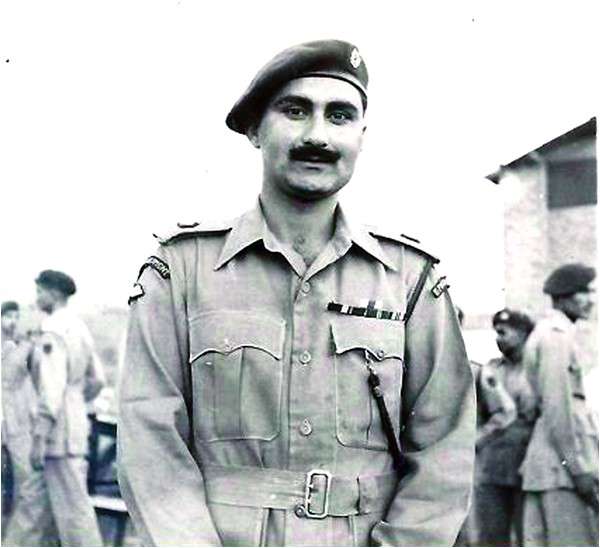
Another person with whom he and our whole family, had a very close relationship with was our dear mother’s Aunt, Mami Agha Begum, fondly called Agha Begum, who lived in Quetta in this most heavenly and beautiful place called 7 Springs. The visits to her house were and still remain one of the most memorable and enjoyable memories of my childhood.
He wrote extensively on Geo Politics, Military issues, especially on the Region: Afghanistan Iran, Pakistan, India. His writings are captured in a series of Books called “The Mehdi Papers” Three books in Urdu and one in English called the “The Politics of Surrender and the Conspiracy of Silence”. He was a great supporter and proponent of the Kashmiri and Palestinian movements for self determination and believed that eventually they will get their rights. He called for a Commission of enquiry into the Causes and conduct of both the 1965 and 1971 wars. He was the first writer who questioned and analysed the poor Pakistani military leadership in both wars. He was subsequently asked by the Hamood ur Rehman Commission enquiring into the East Pakistan debacle to become an Amicus Curiae. He was also asked to give his very detailed views on the debacle. This testimony to the commission is worth reading for people investigating the causes of Pakistan downfall.
His last book, The Politics of Surrender and Conspiracy of Silence, was published by Crescent International from Canada by his great friend and admirer Dr. Zafar Bangash, to whom we also owe a great debt of gratitude.
Gen. Musharraf was the first Army Chief who acknowledged publicly our father’s contribution to the Army, the SSG and Pakistan. Before this Agha was a persona non grata and military officers and establishments were ordered not to invite him because of his writings about the mercenary role of the Pakistan Army. For this we are forever grateful to Gen. Musharraf for this great honour he gave our father.
In December 1976, his and my unit 15 Punjab honored him with the honorary Colonel of the Battalion honour. I had just joined the Regiment in April that year and the youngest and junior most officer in the unit. For a young green behind the years officer, just to be introduced to Generals was quite something but to be introduced to the going to be Honorary Colonel of the Battalion and former Group Commander of the SSG and that too my own father was enough to make my knees go all jelly. As he came down the line of officers being introduced and saluted to, as I had dreaded, I was suitably and loudly up braided by him for a “poor salute” and a poor posture.
Not that it was. Knowing him, I dared not give anything, but the perfect salute, finger on eyebrow, quivering arm, chest out, ramrod straight. But then this was his style.
Earlier in 1972 Zulfiqar Ali Bhutto asked him to train the People’s Guard and establish the Federal Security Force, which he refused citing that these forces would become ZAB’s personal security militias which they did.
The offer came through the late Gen. Akbar, Bhutto’s National Security Adviser. I happened to be in Islamabad in the house in 1972, when Gen. Akbar came to make Agha this offer.
In 1969, very few people also know that Shaykh Zayed bin Sultan , the late founder of UAE, asked him to help train the UAE army which he also politely declined saying that the only Army he could and would train was the Pakistan Army. The offer, as one can imagine was incredibly generous. But the Colonel said no. It was only his Iranian friend and fellow course mate in Staff College, Camberley, General Fereidun Djem who had become the Iranian Supreme Commander who convinced him in 1970 come to Iran and help and advise the Iranians establish their War College and National Defence College.
He agreed to an advisory role but not for any financial reasons. Even though he was given the honorary rank of a General, he declined, in a letter to the Shah of Iran, to receive salary, perks and privileges except housing and transport.
He stayed their for a little more than a year, finally requesting to be released and return to Pakistan. Iran honored him with one of their highest civilian awards the Nishan e Hamkari Shahenshah e Iran, earlier given to only two recipients before him and both Iranians.
In Pakistan in 1973 he worked again without any salary or perks and privileges with Dr. Mubashar Hassan in Bhutto’s government as his Special Adviser on Northern Areas and left when Dr. Mubashar left the Economic Ministry despite being asked to stay on. Dr. Mubashar remained a good friend.
From the mid 70’s to end of the century Agha wrote extensively on military issues, geo-politics and politics.
His articles were carried by all leading English and Urdu newspapers and periodicals.
He was a most active and sought after speaker inside and outside Pakistan on his areas of expertise and extensively delivered talks and lectures in Pakistan, Iran, Afghanistan, UK, USA, Canada.
He was a great advocate of a people’s Army concept much like Israel of a small core of highly professional fighting unit and universal conscription in time of need and war.
He was completely against the Military’s involvement in politics and civil governance and wrote extensively on the subject especially during Zia’s rule.
He believed that by keeping a small standing army we could divert precious funds towards economic development, thereby making us even stronger. And with universal military conscription similar to Israel or USA we would also address our security concerns, especially concerning India. He wrote a very powerful treatise on the subject titled “A Nation at Arms”. At a future date not too distant, By Allah’s Grace I will write his biography which is already in the works and share more of his life, especially his intellectual contributions.
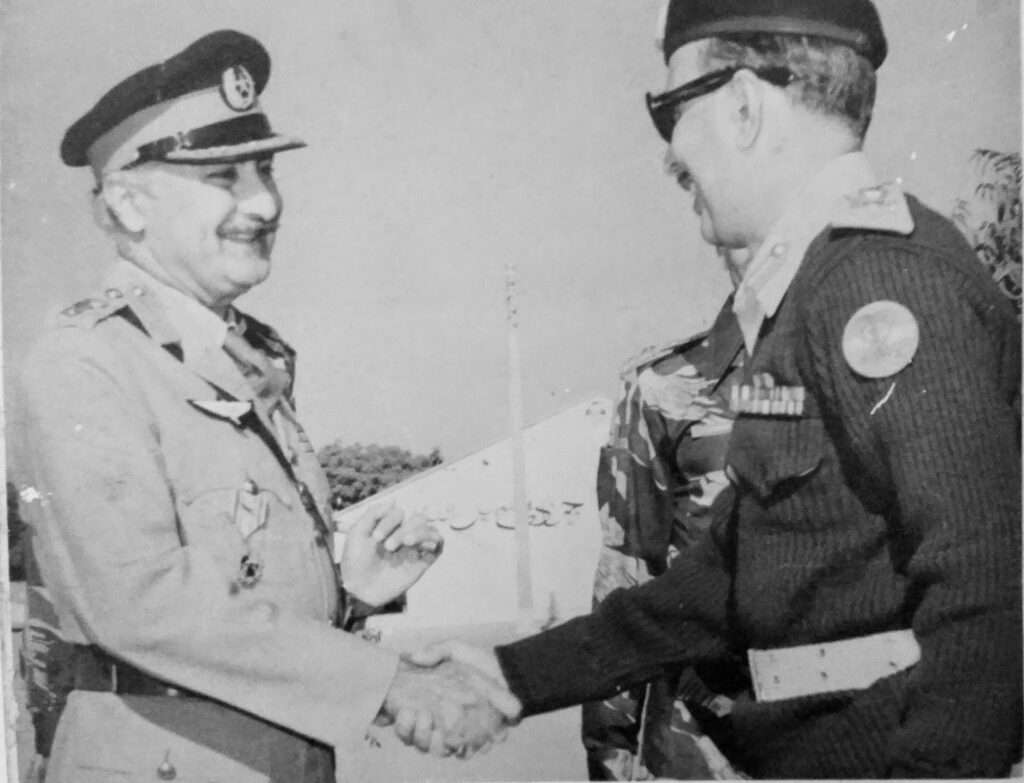
In his later years he was extremely upset at the use of proxies in Kashmir and Afghanistan, and on Zia’s death declared that the snake nest that Zia left behind would devour Pakistan !!He was a great supporter of the Iranian Islamic Revolution and of Shia Sunni unity. This is what brought him close to Maulana Maududi the founder of the Jamaat e Islami.
He actively promoted this thought in his writings and talks and disseminated many of Imam Khomeini’s rulings urging Shias to minimise theological and practical differences. Such as methods of prayers, the Kalima, the Azan. For this he was supported by many leaders on both sides but also earned the ire of some very traditional Shia Ulema in Pakistan.
During a visit to a post Shah, Revolutionary Iran, where invited to speak at a conference, he was requested to meet the Iranian Military High Command.
So that evening the entire senior leadership of the Iranian Armed forces came to see him with one question. Should they continue the fight against Iraq or seek peace?
Agha looked around the room at their expectant faces and inquired why they asked. The response was that they had to submit a recommendation to Imam Khomeini on the subject. Agha then gave the military balance of power between the two countries now in favor of Iraq and becoming stronger because of Iraq’s support by all Arab countries especially Saudi Arabia with its wealth. Therefore his recommendation was to seek an end to hostilities.
At this stage a senior general from the Baseej, the Revolutionary Guards expressed dismay and said that they have millions to fight and defeat Iraq. Agha’s answer was that while they could chose to do that, it would NOT result in Iraq’s defeat but only dramatically increase the size of Bahisht e Zahra, the graveyard of the Iranian Shaheeds in Tehran!!
So better move towards truce and peace.Very soon after Imam Khomeini announced the acceptance of a ceasefire with Iraq.
When the USSR invaded Afghanistan in 1979 December he predicted in an article published in the Pakistan Economist in January 1980 that “…..this was a war Russia cannot win and must not win……. and that after this war USSR would disintegrate……”. There was an interesting ending to this deduction.
Years later in 1989 he came to stay with us for several months in Boston USA during my mid career MBA at Boston University. His reputation had preceded him and so one day he received an invitation from the President of Boston University to a luncheon to meet and talk to all the Deans of the University. I tagged along. During the lunch Dean Matre, Dean of Communications, if I recall correctly, a Ukrainian by origin, quizzed Agha on his prediction that the USSR would disintegrate into independent republics. Agha presented his rationale to which the Dean with his full academic arrogance said. “….but never Ukraine….” . Agha equally forcefully replied. “…..if no other Republic Dean Matre, but certainly Ukraine….” as the Dean began to marshal his response, Agha followed it up by saying….”Dean it’s such a wonderful day in Boston, exquisite food and I believe Nelson Mandela is also coming to Boston. …let’s talk again in a few years….”
Years later after the USSR disintegrated Dean Matre sent Agha a most generous letter acknowledging like a true gentleman Agha’s incredibly accurate conclusion. One of Agha’s favourite sayings was that those who don’t learn from history are doomed to repeat it.
He predicted the Fall of East Pakistan in a lecture in Staff College Quetta in 1963 in the presence of then Commandant Staff College. Maj. General Sahibzada Yaqub who recognised his prescience years later.
He also told a visiting US general in 1963 while delivering a talk at the newly founded War College where he was the Chief Instructor that the USA would not be home by Christmas 1963 from Vietnam but will get bogged down in a war from where it will be very difficult for them to get out off. The wager was a carton of Rooh Afza. Not sure if the USA General was able to fulfill the wager.
While never a member of any political party the only person he actively supported was Air Marshal Asghar Khan and his Tehrik e Istiqlal of which I was also a card carrying member. The Air Marshal was also a great personal friend and Agha in his recent years would reach out to meet the good Air Marshal.
Amongst his and our mothers close friends from the Army were Late Gen Attiq ur Rehman and late Auntie Farhat, one of Pakistan’s finest soldiers. Gen Sahibzada Yaqub and Auntie Tooba, with whom he would have great intellectual jousts on military strategy. Late Lt. General Abdul Hamid Khan and Auntie Surraiya. Late Maj. General Abid Bilgrami and late Auntie Izzat. With late Gen. Sharif, then Brigadier, under whom he served as CO 15 Punjab, he had a long and close relationship. Also late Maj. Gen Ahsan ul Haque who later as Head of Zia’s enquiry commission unearthed the FIR filed by Ahmad Raza Khan Kasuri which was to have such fateful consequences for Bhutto.
Another close friend was the late Brigadier Asad Namazie and his wonderful wife Auntie Khateej Khanum, both iconic in their own right. Our two families also became very close from our childhood days and so are till today. Late Col. Irshad Rashid MC was also a respected friend who he admired and wrote a beautiful eulogy on Col. Irshad‘s rather early transition. Another close friend was the late Col. Maqbool Ilahi who he fondly called Murshed and Maujuddin saheb.
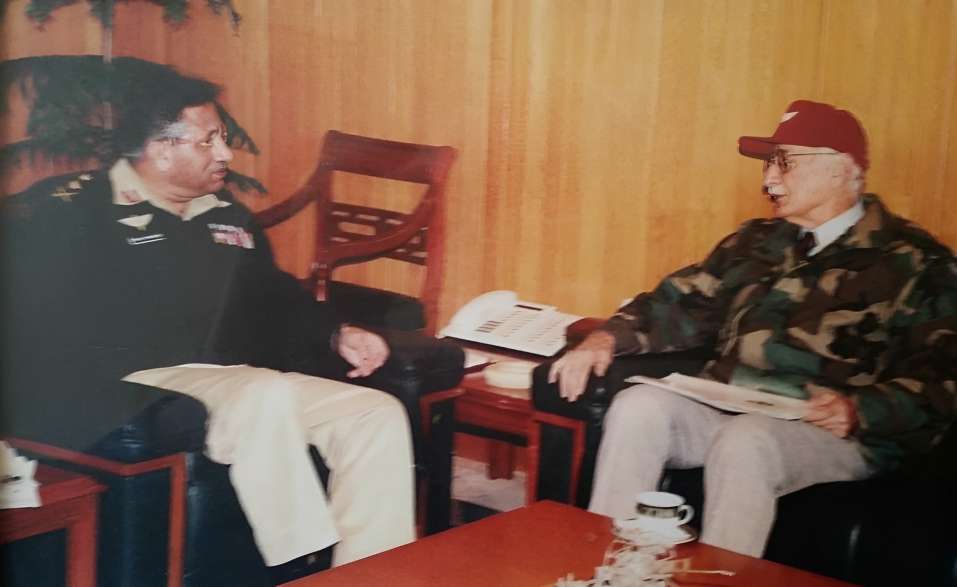
One very special friend was the late Raja saheb of Mahmoodabad who also nearly became one of my sister’s father in law. The proposal from Raja saheb for his son for my sister, Yasmeen, came one day after our parents had accepted another!!
Agha was also instrumental in dissuading Raja saheb in becoming an interim Prime Minister under Gen. Yahya.
He also developed very close intellectual relationships with Hakim Saeed saheb of Hamdard foundation, the late Prof. Karrar Hussain and Zia ul Hassan Zaidi sahab the last helped him publish his books in Urdu. The late Admiral Ahsan, former Naval Chief & Governor of East Pakistan, another very rare moral and upright human being was another person with whom he had a wonderful relationship. Admiral Ahsan also wrote the foreword for one of his Mehdi papers serials as did Salman Ali saheb, a former foreign minister.
In his later years he and the late Ardeshir Cowasjee became really close. Perhaps because both had no time for hypocritical people and double speak. Other people who he respected and whose company he enjoyed were DM Qureshi saheb former Chairman, State Life and Bankers Equity, Feroze Shah Gilani saheb, who helped him file a suit against Gen. Musa and the late Lt. Gen. Jehandad Khan, founder of the Shifa eye trust.
Other people he spent lot of time with in his writing years was the late Majid Nizami sahab of Nawai Waqt who would publish his articles word for word without any editing and his younger brother Arif Nizami saheb. Such was their respect for Agha. The legendary A T Chaudhri saheb of the Pakistan Times who first published his articles in English. Salahuddin saheb of Takbeer was also a frequent visitor to our house to pick Agha’s brains. Zia Shahid and Altaf Hussain of Urdu Digest, as well.
Agha drew his inspiration from the Prophet, Hazrat Ali, Allama Iqbal, Quaid e Azam and Imam Khomeini. He was also a great admirer of Maulana Maududi and had interacted with him on many occasions.
Maj. Ikram ul Majeed Sehgal, Chairman of SMS WACKENHUT, and a much celebrated author and geo political and defense expert in his own right has done much to let the world know about our father to which I and our family are greatly indebted.
Agha had a special relationship and fondness for Ikram saheb and would have long discussions on National and international affairs, with him. Last year he specifically instructed me to deliver all his documents in original into Ikram saheb’s safe custody. He is our father’s rightful spiritual protégé and son.
In his personal life, Agha suffered one very deep personal tragedy from which he never truly recovered. The brutal and senseless assassination of his beloved elder son in law the iconic Shaukat Raza Mirza, then Chairman of PSO and one of Pakistan’s greatest business Captains, married to my elder sister Naheed. It has been said that Dawn Newspaper carried the second highest volume of condolence messages on Shaukat Bhai’s departure. The highest was on the Quaid e Azam’s death !
Agha, from then on called him, Shaukat Shaheed and his lips would quiver every time he spoke of him.Shaukat bhai’s tragic passing away hit the whole family very very hard. Especially my sister, Naheed, who suffered the most as her whole world disintegrated. Being a woman of immense faith and courage has helped her tremendously. Their children, Farhi, Maham and Shahrukh, also devastated, have slowly picked up the pieces. All Masha Allah doing very well in life. Shaukat Bhai was such an incredibly angelic person that metaphorically speaking, even the gods shed tears at his passing.
But I don’t think, we, as a family were ever the same again.
Agha’s memory was photographic. His knowledge, encyclopedic. His analysis, razor sharp. Despite having listened to him discoursing on history and current affairs for as long as I can remember, they always continued to marvel me. I would occasionally pick up one of his old articles or be given one again for the umpteenth time and yet every single time I would be amazed at his intellectual brilliance, his clarity of thought, his masterful art of writing, and ability to marshal information so concisely and brilliantly and his …oh so accurate analysis and predictions on current events. He was truly gifted by Allah. Everyone who was a part of part of his life, family, friends, colleagues, seniors, juniors, all had the same experience of awe and amazement. Masha Allah.
But with those unfortunate souls who crossed swords with him with limited information and or knowledge in his area of expertise, he was ruthless !!.The punishment was either a really really long lecture, to be listened to in complete silence followed by a curt recommendation to read this book and that book and then given photocopies of his articles and writings, some to be read in deathly silence right there and then!!
The less fortunate, if lucky, were just treated to a silent cup of tea, if that, and sent post haste back to where they’d come from!!
Sheena and our children, Sara Haider Mehdi, Shayaan e Mohammad Mehdi and Shaan e Ali Mehdi were privileged that he lived with us for many years and on a daily basis soaked in his tremendous wisdom and intellect. They would listen rapturously as he took them to distant battlefields and historical events in his amazingly easy to understand style, rattling of dates, names, events, weaving and linking an intricate mosaic in his magical style. In return the boys taught him the intricacies of Saeed Ajmal’s “doosra” and Sara sharing his love for history, researched for him. Sheena, also a wonderful artist, drew and designed the covers of 3 of his books, which everyone who got them, heard about !!
Finally at 1036 am on Friday 13th March, 2015, this Great Pakistani, Warrior, Soldier, Beloved Father, Grandfather, Great Grandfather, Brother, Uncle and above all Agha to all, breathed his last on the auspicious day of Jumma Mubarak to meet His Creator.He was surrounded with love and prayers till his last breath by his four children, Naheed, Yasmeen, Haider and Ali.
From Child to Adult and back to Child and then back to Him.Such is the way of the Almighty!
ODE TO A SOLDIER
The battle’s over,
The victory’s won.
A soldier makes his journey home.
He fought so hard,
He fought so long.
And now he sings a victor’s song.
It was not easy.
It was not slight.
But it was such a worthy fight.
The battle scars,
They tell the tale,
That war sometimes can be like Hell.
But he fought the fight,
Endured the pain,
For he knew just he would gain.
Commendations,
Medals, cheers,
Those things fade across the years.
But his gain would be
Much more than that—
A place where only few have sat.
An honored seat,
A place of call,
To sit before his General,
And hear the words
That come from Him,
You fought the fight, now enter in!
May Allah Grant His Dear Departed Soul Eternal Peace and Happiness in the Final Abode. Aameen.
